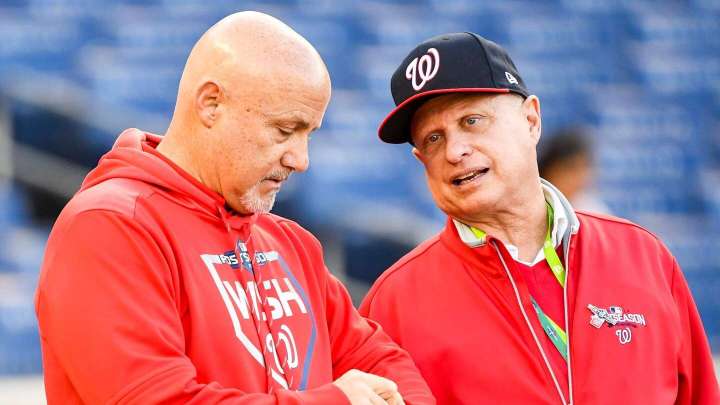At least five interested parties, including mortgage mogul Stanley Middleman and South Korean billionaire Michael B. Kim, have looked through the Washington Nationals’ financial reports and met with team personnel, and the Lerner family will seek initial bids before the end of the regular season for a potential sale of the team, according to multiple people familiar with the process.
At least five potential buyers have toured Nats; bids expected in weeks

The Nationals’ recent trade of star outfielder Juan Soto to the San Diego Padres was an unusual complexity, but the team’s sale process did not directly dictate the decision, those people said. Three people with direct knowledge of the Soto deliberations said the Lerners did not seek input about Soto from any of the potential bidders. All spoke on the condition of anonymity to speak candidly about an ongoing process.
Allen & Co., the firm hired by the Lerners to handle the sale, declined to comment for this story, but two people with direct knowledge of the situation said the firm’s only advice was simple: Do what you would do if you were going to continue owning the team and make the best decision for the health of the franchise moving forward. If Soto signed a long-term contract to remain in Washington, he could be a selling point, a cornerstone. If the Nationals traded him and replenished their minor league system in the process, then a would-be bidder could inherit financial flexibility and a clean slate for the future.
The potential sale, however, did have some influence in what the Lerners felt they could offer Soto and his agent, Scott Boras. The Nationals’ proposed 15-year deal worth $440 million with no deferred money was more than the team had ever offered a player — and more guaranteed money than any team in baseball had ever given anyone, for that matter. But Boras since has stated he wants Soto to receive a deal that would match or exceed the $43.3 million in average annual value the New York Mets gave Max Scherzer last year.
Anyone who purchases the Nationals will be inheriting approximately $500 million in debt, including $200 million owed to Scherzer and Stephen Strasburg, and a long-term deal for Soto on Boras’s terms would have meant committing another $500 million or more. Considering the team seems likely to sell for less than the $2.4 billion Steve Cohen paid for the Mets in 2020, that’s a daunting amount of inherited expenses.
So, according to General Manager Mike Rizzo and confirmed by others on background, when Soto did not agree to the best deal the Lerners thought they could offer, they told Rizzo to see what they could get in a trade. Once Rizzo received what he considered a good offer, the owners told him to make the deal.
The sale of the team “was not a consideration. That’s above my pay grade,” Rizzo said in his news conference Aug. 2, the day the Soto deal was made. “I’m here to make this team the best that it could be. This was a prudent move. This was a prudent baseball move.”
Rizzo also said something that day since confirmed by multiple people with knowledge of the Lerner family’s thinking: “There was no edict” to trade the 23-year-old star once he declined the Nationals’ contract offer; if no team met their demands in return for Soto, they would not have traded him.
Many people in the Nationals’ front office argued that the team would never get more value for Soto than it would now, when any team acquiring him would have him under contract for three postseasons. People around managing principal owner Mark Lerner argued that Washington’s minor league system, despite an offseason retooling, was not going to start churning out major league starters without an infusion of elite talent. Without the deal, the Nationals might not compete for three or four years. With it, people close to Lerner argued somewhat optimistically, they might be able to accelerate that process and compete within two or three. Washington was not winning with Soto, and it would not get easier to build around him as his salary ballooned in arbitration.
Though Scherzer’s, Strasburg’s and Patrick Corbin’s contracts are still on the books for the next few seasons, the Nationals do not have any other major financial commitments — nor even anyone who stands to make a big leap in arbitration — starting next season. By 2025, they have just the $35 million committed to Strasburg on the books. If a young core emerges in the next few seasons, whoever owns the team will have the financial flexibility to bolster it with free agents.
But even if the Nationals had wanted to cater to the whims of a likely buyer, they are not far enough along in the sale process to know what such a buyer might want. If any of those interested parties decides to bid on the Nationals, they will craft that bid based on their sense of the franchise’s value — not based on a specific asking price from the Lerners. So whether any of them will offer an acceptable bid and emerge as a front-runner remains unclear, as does exactly how much the Lerner family will deem sufficient.
People around the team expect the process will reach a resolution by the beginning of next season. The Lerners should get a sense of how others value their franchise within a month or two as potential bidders decide whether to bid and how much. Regardless, those bidders will not have to worry about Soto, whatever they would have preferred in terms of his future. That decision was not yet theirs to make.






